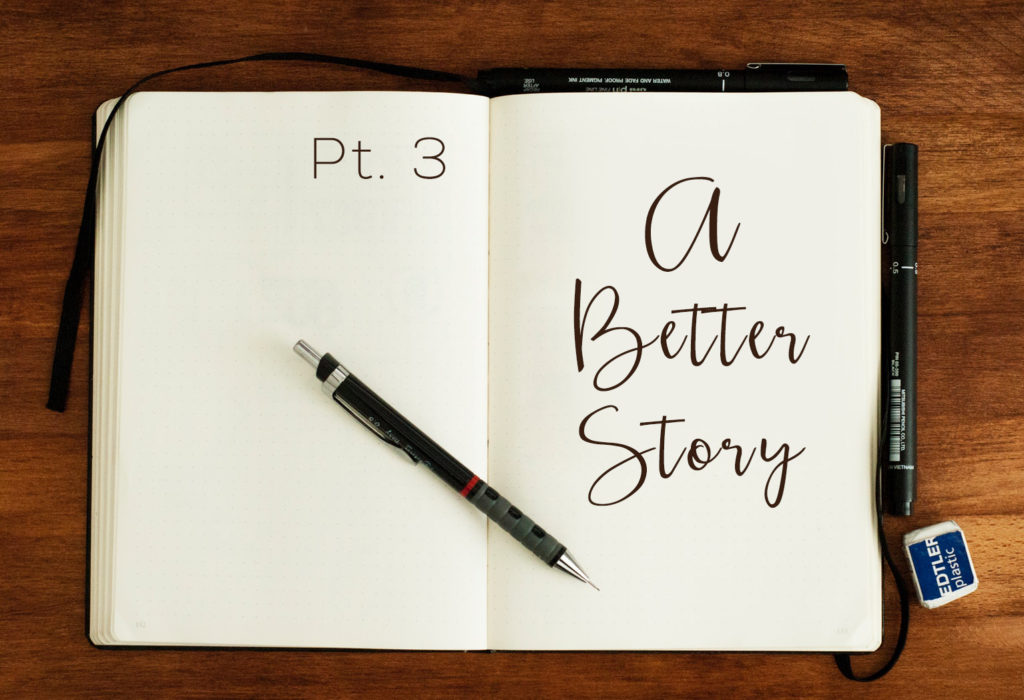A Better Story – Part 3
Doesn’t Forgiveness Have Limits?
A tall gentleman, donned in a long, beige, wool coat, slowly approached the Dutch speaker as her riveting message on forgiveness came to an end with a resounding applause. Corrie ten Boom shared her miraculously story of survival during the Nazi Holocaust throughout World War II. Separated from her mother and Father, she watched her beloved sister die beside her in a German
concentration camp. Now she traveled throughout Germany, speaking of an even greater miracle than survival: Forgiveness.
As Corrie lifted her eyes to address the stately gentleman before her, her heart froze. Standing before her was the soldier at whose hand her sister, Betsy, died. This man mocked and gawked and abused his prisoners. How could he now approach her, hoping to be included as a recipient of God’s forgiveness?
“Fräulein ten Boom, Thank you for your testimony! I desperately needed this message on forgiveness as I long for Jesus to forgive me.”
How dare he? She refused his extended hand. Thrusting her own hands tightly into her pockets, she prayed, “Oh God, even You know, forgiveness must have its limits! I cannot forgive this man!”
In that moment of pain-filled remembrance, the Holy Spirit gently guided her memory to a promise: My love has been poured out into your heart through the Holy Spirit, who has been given to you. (Romans 5:5b)
She felt God whisper, “Corrie, my love in you is much stronger than all the hate in you.”
Putting her faith in God’s presence with her, she lifted her shaking hand to receive the hand of her enemy. She describes that moment the moment hate lost its footing in her soul. “I never experienced the ocean-depths of God’s love more than in that moment when I chose to forgive my worst enemy with God’s own love!”
The offender and the offended stood with hands locked together, tears streaming down their faces, both experiencing the overwhelming love of God.
Corrie ten Boom’s struggle with forgiveness resonates with me. When my heart faced betrayal, I was certain God would excuse my inability to forgive. Surely, if anyone understood my right to cling to my hatred, it was God.
- To fully comprehend the limitless forgiveness God enables us to extend, we must understand what forgiveness is not. It is not glossing over the evil that was done to you.
- It’s not calling something whole that’s fractured or something pure that’s corroded. 1
- It’s not forgetting the wrong that’s been done. There’s no need for forgiveness if there is no memory of the wrong done to you.
So then, what exactly is forgiveness?
One of my favorite quotes defines it this way: It’s looking in the face of what our offenders have done, recognizing their wound for all that it is, and then choosing to forgive. 2
It has nothing to do with denying the wrong caused by those who hurt us, but has everything to do with changing our heart towards them.
Scripture says, “Do not repay evil for evil.” In other words, what happened to you wasn’t just wrong, God sees it as evil!
But God also sees our revenge, our hatred, our yearning to get even—as evil!
Forgiveness without limits is the bold choice to declare, “I’m not going to partake in evil by offering every ounce of energy to plan the demise of the one who hurt me, or pray for his destruction, or rejoice when he/she get news of a life- threatening illness.
God says, “It is mine to repay. I will avenge you!”
Forgiveness is believing Jesus is writing a better story for you, down a different pathway—a pathway of freedom. A pathway where you are set free from the chains of your painful past.”
Next week we will conclude this journey down the pathway of forgiveness by examining how to walk confidently in forgiveness and the surprising fruit forgiveness brings.
1 From God’s Fitting Room by Kelly Minter
2 From Forgive and Forget: Healing the Hurts we Don’t Deserve by Lewis Smedes

Leave a Reply